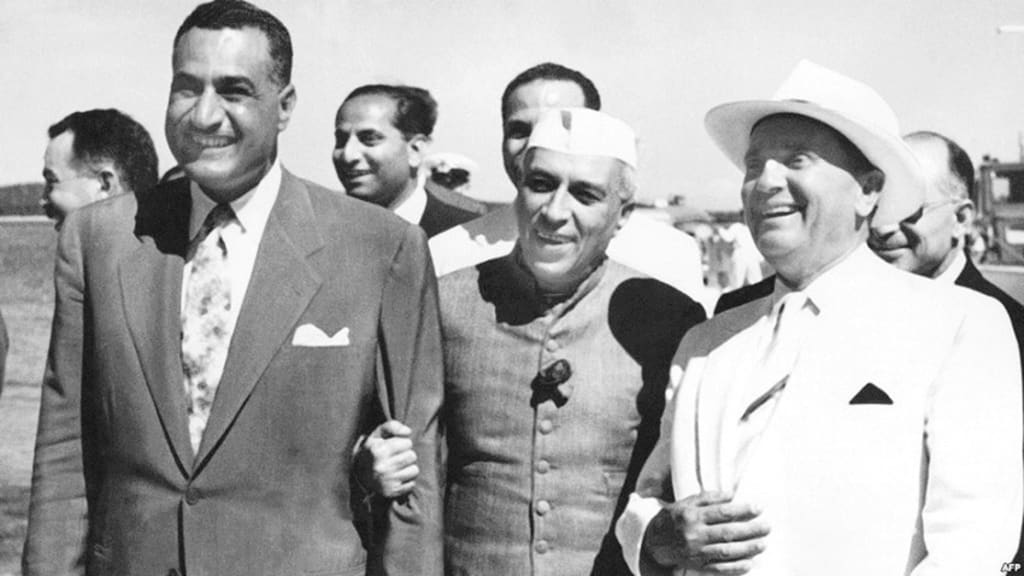Does neutrality and impartiality have any meaning in today's world?
It has become common to describe the world as divided between a resurgent Western bloc and an authoritarian, totalitarian alliance between China and Russia. But this way of thinking has its limits.

It must be said first that the West is not always united, as the recent trip of the French President demonstrates Emmanuel Macron to China. What is most remarkable about the great geopolitical competition of the twenty-first century is that what At least 4 billion people, more than half of the world's population, live today in more than More than 100 countries do not want to take sides.
We should also point out that these "non-aligned" countries are collectively becoming more important in The shadow of the fragmentation and disintegration of the world system. Countries such as India and Saudi Arabia, for example, today make deals across these divisions, as well She wants to have a greater say in world affairs.
However, we must not miscalculate. This half of the world is so vast that it will never function as a block. But if we want to understand why oil prices have risen to more than $80, or How to reshape supply chains, or the prospects for peace in Ukraine, the non-aligned countries are growing part of the equation.
The rise of these countries also raises a big question: As China and the West compete for influence over these countries, Who will win in the end?
It must also be said that Non-Alignment has a dubious record. This movement began in the fifties of the last century as a coalition of developing countries that were keen to practice its new sovereignty amid rising tensions between America and the Soviet Union.
Over the decades, this movement degenerated into anti-Americanism. In light of the absence of cohesion among its states, military influence, and permanent membership in the United Nations Security Council, Economic weight or presence on the frontiers of technology and finance, the non-aligned countries had little to do with it Power
In 1956, then-Secretary of State John Foster Dulles described the Non-Aligned Movement It is an "immoral" movement. With the end of the Cold War, the Non-Aligned Movement became irrelevant.
At first glance, the 100-plus countries remain ostensibly neutral and face many challenges. The same problems that the Non-Aligned Movement faced in the twentieth century.
These countries have little in common to be as cohesive as the West, or even the Sino-Russian alliance of convenience Huge democracies like Brazil and India have few common interests, let alone a common agenda with the states Oil rich for example.
These neutral countries still depend in reality on the West, led by the United States of America. China and Russia in technologies, from semiconductors to weapons, and these countries also practice a lot of Its trade is in the American currency - the dollar.
However, it is a mistake to underestimate the importance of the role of these neutral countries for two reasons. First, the economic influence of these countries is on the rise. Consider the 25 largest economies that are not aligned, or classified as those that have not imposed sanctions against Russia, or said it wanted to be neutral in the midst of Sino-US competition.
Together, these countries make up 45 % of the world's population and their share of global GDP has risen from 11 % when the Berlin Wall fell to 18 % today, more than the European Union itself with its own of scientific, technical and productive energies. After decades of free globalization, the common pattern of trade between these countries has become multipolar, with division Tripartite between the West and China and other non-aligned countries.
Second, these countries' approach to the world, shaped by their desire for national development, has become pragmatic and rigorous. . They have become unlikely advocates of globalization: from Mexico to Indonesia, they want to trade freely With both sides of the geopolitical divide, seizing profit opportunities while restructuring supply chains away from dependence excessive on China.
We show here that pragmatism also means that these states also have limited confidence in the institutions of the system they are in Led by the United States after 1945 such as the United Nations or the International Monetary Fund, which they see in a state of chaos and decay. Western calls to defend the liberal order or human rights are often seen as self-serving inconsistent and hypocritical.
The result is a flexible, transactional approach to the world, where countries move around and transact in an effort to make gains. Unaligned people often work alone, but sometimes they work in concert.
The Organization of Petroleum Producing and Exporting Countries (the oil cartel) has shown greater rigor, as it decided this month to cut production By 4 % despite Western complaints. Luiz Inacio Lula da Silva, the President of Brazil, promotes a "peace club" to end a war Ukraine. India wants to use its G20 presidency this year to push for the global south.
You can expect these power projection experiences to be very difficult - but they can grow more ambitiously. In technology, India wants to export its digital service "stack".
In the field of defense, Turkey sells more weapons, including drones, and operates India to expand its navy. In finance, the system for reinvesting the trillions of petrodollars has become less Western-focused.
Given their limited responsibility for historical carbon emissions and their vulnerability to changing weather, non-aligned countries will seek more of influencing climate policy. Even as most countries want to avoid having to join one geopolitical bloc or another, Great powers are competing with it to win it.
China does not view non-aligned countries as open to bidding, buying and selling, as the Soviet Union did .
However, over time, weak, non-aligned states will certainly realize that the world in which the force is More suitable for bullies than anyone else. The soft power of totalitarian China has its limits. As for citizens of countries that take money from China, they hardly line up to immigrate to Beijing.
However, the West needs to be prepared to compete for influence. The United States and its allies must resist the temptation to slip into tactics that may end up dead By throwing these countries into the arms of their opponents.
However, appeals to the liberal order created after World War II will not be enough to win Arguably. Instead, the West should also deal with the non-aligned countries on their own transactional terms, with a mix of intimidation and carrots.
Some of the West's strengths remain: access to markets, technology, and the free flow of information. Other parts of her proposal could be improved, including by offering a more flexible network of security relations, such as those America already has with India; and other hard benefits, from easing debt to climate finance.
The emerging world order is still a long way from America's unipolar moment in the 1990s the past. But in the market for influence, the West can compete. More than 4 billion people are keen to see what Western countries have to offer.
About the Creator
News Correct
Information WorldWide MORE INFORMATION
Enjoyed the story? Support the Creator.
Subscribe for free to receive all their stories in your feed. You could also pledge your support or give them a one-off tip, letting them know you appreciate their work.






Comments (1)
Neutrality is a passive policy, without a core principle other than the avoidance of trouble, and with its limits defined by the belligerents. But impartiality-whether defined by the parties to the conflict or the actor himself-is a coherent position predicated on a judgment of the protagonis.https://campingstartup.com/best-camping-fans/